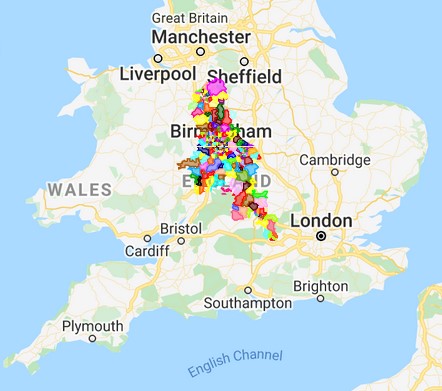An Archdiocese has been accused of “ruling by diktat” after it said all schools must begin joining Catholic multi-academy trusts by September next year.
Bernard Longley, Archbishop of Birmingham, wrote to governors and heads this summer saying it was an “essential” reform to protect Catholic education.
He asked directly for the “full cooperation” of foundation governors and chairs in reaching the target. The letter, seen by Schools Week, comes five years after the Archdiocese first began promoting conversion and “multi-academy companies”, as some Catholic trusts are known.
The Archdiocese covers a large geographical area that not only includes Birmingham and surrounding areas, but also spans from Stoke to parts of Reading.
Its website says it oversees 240 schools, and a September newsletter said 143 had joined 16 “multi-academy companies”.
But the directive has sparked a backlash, with the NAHT union convening a local meeting of school leader members and governors today to discuss how to resist the plans.
Rob Kelsall, national secretary of the NAHT, called it an “arbitrary” date which goes against messaging from new education secretary Nadhim Zahawi.
The minister said last month he would not set an “arbitrary deadline” for all schools to be in multi-academy trusts.
Kelsall accused the Archdiocese of “ploughing on belligerently to force through academisation”, despite the government itself shying away from blanket compulsion since an ill-fated 2016 bill was dropped. 2022 was the government’s proposed deadline at the time.
“The Diocese are effectively ruling by diktat and it has to stop. Such behaviour has no place in a modern education service.”
While conversion could be a “positive step” for some schools, it should be up to leaders and governors rather than the governnment or dioceses, Kelsall added.

Some school leaders are “fearful of speaking out for for fear of their jobs”. The union claims even some schools whose governors voted against joining multi-academy trusts or considered other collaboration arrangements had been “told they have no choice”.
But the Archbishop’s letter said the academisation strategy reflected “changing needs of schools” and the “educational agenda of our country”.
“I know that the work of academisation has been challenging, demanding on time and resources, but it is bringing many benefits to schools.”
It comes a day after a local council which wants all schools to consider conversion issued a statement with the NAHT saying there would be no forced conversions or “arbitrary deadline”.
Swindon council backtracked last month on plans to convert all schools by 2025, citing Zahawi’s “different line”, but unions had remained concerned about its agenda.
An Archdiocese spokesperson said: “In recent months meetings have been held with a number of schools and [multi academy companies] regarding future plans for Catholic education and in each case, care has been taken to meet and listen to staff and governing bodies, and to consider and revisit where appropriate the various options available before asking schools to enter into dialogue with each other.”
















An Exposition: the letter of 10th December 2021 entitled “Important Update on Archdiocesan Academy Strategy and Vision”, over the signatures of the Chief Operating Officer and Education Lead Trustee of the Catholic Archdiocese of Birmingham.
This letter deserves careful consideration on account of what it has to say, but more importantly for the sake of realising its meaning and taking that meaning to heart.
The two signatories of the letter, one must quickly acknowledge, make clear that they are not presenting their own decision and their own views. They are the voice-piece of the diocesan archbishop.
The message of the letter, albeit sensitively, carefully and obliquely expressed, is an ultimatum, an ultimatum to all who have executive or directing responsibilities in the voluntary-aided schools of the archdiocese – whether as headteachers, senior leaders, or foundation governors. They must transition to become academies in a grouping of academy schools no later than September of next year, or, at the least, be irrevocably committed by that same date, procedurally, to being so; they have available a period of nine months to comply with the instruction.
What is the meaning of the letter? This can be discovered readily on the second page. By a simple change in type colour and by altering the format of one paragraph, the writers focus their readers’ attention and at once elevate what they are saying to the Catholic spiritual plane.
In the blue-coloured paragraph, two words, “mission” and “missionary”, tell those in responsible positions at voluntary-aided schools that compliance with the archbishop’s instruction is a duty divinely placed upon them. Those two key words are not explained. There is no need for an explanation. Reference alone to the commission given by Jesus Christ himself to his disciples is sufficient; it leaves no room for doubt. The import that the two words carry has long been well-established in the thinking and frequent exegesis of the Catholic Church.
The meaning to take away is this. Those who are associated with voluntary-aided schools will not be able to serve God and neighbour with joy and vibrancy, while they remain outside a MAC structure. They will not be part of the “vision” of their local Catholic Church, if they continue to withhold full co-operation with their archbishop. Indeed, those people are set on a mistaken path. They have, they should not fail to recognise, gone astray already.
That one paragraph also speaks implicitly and with disturbing incisiveness to all Catholics who now work in Birmingham’s voluntary-aided schools and still think of themselves as serving the Christian mission of the Church thereby.
22-12-21
Tony Meehan
(Retired education consultant)